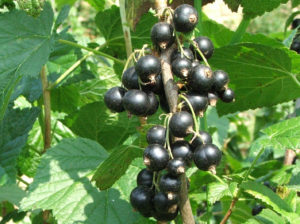 Every study I've seen in the past decade finds that eating berries has health benefits. A recent study from Finland adds to this by finding that eating some blackcurrants after a meal has beneficial effects on blood glucose levels. This beneficial effect occurred even though the blackcurrants were eaten as a puree with a little sugar (because they are sour berries).
Every study I've seen in the past decade finds that eating berries has health benefits. A recent study from Finland adds to this by finding that eating some blackcurrants after a meal has beneficial effects on blood glucose levels. This beneficial effect occurred even though the blackcurrants were eaten as a puree with a little sugar (because they are sour berries).
The study found that one didn't have to eat a lot of the blackcurrants - 75 grams or 2/3 cup, which was eaten as a puree. Since this study was done with 26 young healthy volunteers, they did not find an effect on inflammatory markers - which were good to start with.
Other studies have found similar beneficial blood sugar level effects from eating other kinds of berries. Berries are rich in polyphenolic compounds, and dark colored berries are especially rich in anthocyanins. The blackcurrants (Ribes nigrum) were chosen for this study because blackcurrants are native to Finland, and both grow in the wild and are cultivated there. Cassis liquor is made from blackcurrants.
From Science Daily: Blackcurrants are favorable for glucose metabolism
Blackcurrants have a beneficial effect on post-meal glucose response, and the required portion size is much smaller than previously thought, a new study from the University of Eastern Finland shows.
Blackcurrants have a beneficial effect on the blood glucose response after a meal. They balance the glucose response of ingested sugar by attenuating its rise and delaying its fall. The effect is likely associated with berry-derived polyphenolic compounds, anthocyanins, which are rich in blackcurrants.
The beneficial health effect of blackcurrants was supported by a recent study conducted at the University of Eastern Finland. In the clinical meal study (Maqua) the beneficial effect on postprandial glucose response was achieved by 75 g (1.5 dL) of blackcurrants, a remarkably smaller portion size than in earlier studies. Blackcurrants are often consumed with added sugar because of their natural sourness, which may be a cause of concern for health-conscious consumers. However, it seems that sugar consumed with blackcurrants is not as unhealthy as sugar consumed without berries.
Berries are an important component of a healthy diet, being rich in vitamins, minerals, dietary fiber and polyphenols. So far, however, the EU has not authorised health claims for berries. In recent years, there have been many studies monitoring the effects of berries on glucose metabolism, with the dark berries, such as blackcurrant and bilberry, having the most convincing results. Black-coloured berries, rich in anthocyanins, seem to attenuate the blood glucose response to added sugar, compared to a control product having the same amount of sugar. The same effect is demonstrated by anthocyanins extracted from blackcurrants. Polyphenolic compounds may slow down the absorption of glucose from the small intestine by interacting with carbohydrate-digesting enzymes and glucose transport proteins. In addition, polyphenolic compounds may reduce oxidative stress and inflammation.
In the Maqua study, 26 healthy participants (22 female, 4 male) consumed three different test products and sugar water as a control product at four separate study visits. The test products were a blackcurrant purée with added sugar, a blackcurrant product containing fermented quinoa, and a blackcurrant product base without blackcurrants. Each of them and the control product contained 31 g of available carbohydrates and had a similar composition of sugar components. Blood samples were taken before the meals in fasting state and postprandially in 15, 30, 45, 60, 90, 120 and 180 minutes after consuming the meal, and analysed for glucose, insulin, and free fatty acids.
